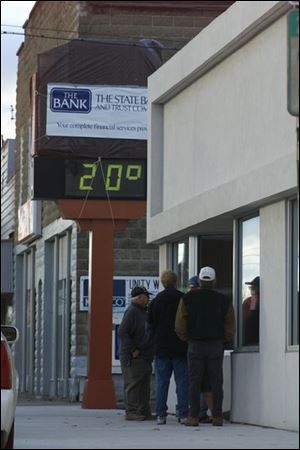
Check-kiting allegation led the FBI to bank scam
2/7/2002
Concerned about their deposits, customers wait outside the Oakwood bank before its opening Monday morning, after it was taken over by State Bank & Trust Co. of Defiance. Mark Steven Miller, the Oakwood bank's chief executive officer, has been charged with bank fraud.
Paulding County banker Mark Steven Miller successfully endured years of audits from banking regulators, but the confessed embezzler didn't account for one thing: questions raised by peers from another small-town bank.
That bank, Liberty National, in Hardin County, tipped off the FBI late last year to a possible $5 million to $8 million check-kiting scheme that involved two car dealerships and the Oakwood bank, according to several people familiar with the investigation.
Researching that tip, the FBI and regulators uncovered the bigger crime: Mr. Miller had embezzled $40 million and invested the money in South Carolina gambling boats.
Now Mr. Miller, the bank's chief executive officer, sits in Lucas County jail on a charge of bank fraud, and State Bank & Trust of Defiance has taken over the Oakwood bank.
Five days after Mr. Miller confessed to the embezzlement, new details are emerging about the other case that led investigators to Oakwood in the first place.
That other case involves millions of missing dollars from a series of transactions between two car dealerships - Steve Myers Auto Sales in Kenton and Winkle Chevrolet in Paulding.
The FBI has described it as a check-kiting scheme, a conspiracy that typically involves a bank customer depositing a check from another bank and quickly withdrawing the money, before the check can clear the other bank. Done repeatedly, it can confuse bankers and over-inflate the real worth of a customer's account.
No one has been charged in the check-kiting investigation, and the FBI and federal prosecutors have declined to offer many details. But defense lawyers involved with the case have confirmed the probe.
“It appears there has been a substantial amount of money sent someplace other than where it was supposed to go,” said Toledo attorney Richard Kerger, who represents Winkle owner Thomas Winkle. “I don't know that anybody really knows what happened.”
The case began Nov. 19, when Liberty National bookkeepers discovered suspicious financial transfers in the Myers account and notified the dealership's board of directors.
“The board was made aware that there was a number of checks traded between Winkle and the Myers agency that didn't look quite right,” said attorney Shelby Golden, of the Lima firm King, Blair, Younkman & King, which represents the Myers dealership.
Although the dealership bore Mr. Myers' name, he owned only 18 percent of the company at the time.
Based on the complaint, the rest of the shareholders voted to remove him in mid-December.
Paul Moser was hired to run the renamed dealership, Flagship GM Center, and he said Mr. Myers “had been misrepresenting what had been happening with profits, sales - everything.”
Mr. Myers' attorney, John Czarnecki, confirmed the dispute between his client and the Flagship dealership: “We are defending that. It's a civil conflict.”
Ms. Golden said the bank notified the FBI, which began investigating the case. Mr. Kerger confirmed that his client, Mr. Winkle, became a target of the probe, and the FBI went searching for evidence at the Oakwood bank. But Mr. Miller was unable to give them clear answers.
According to an FBI affidavit filed in the Miller embezzlement case, Mr. Miller first claimed the Oakwood bank didn't lose any money because a company called “Stardancer Investments” had “made good” on the bad checks. But when the FBI questioned him again on Jan. 29, Mr. Miller said Stardancer, in fact, had not given the Oakwood bank the estimated $5 million it had lost.
Within two days, Federal Reserve Bank and Federal Deposit Insurance Corp. officials had combed the bank's records and found gaping holes. Mr. Miller admitted to the embezzlement, saying he and his brothers were key investors in Stardancer, and Stardancer was a gambling-boat operation in North Myrtle Beach, S.C. Mr. Miller claimed the embezzlement was not related to the check-kiting scheme.
To Mr. Kerger, the Miller embezzlement case only muddies any theory that Mr. Winkle did anything illegal. After all, Mr. Kerger said, Mr. Winkle was coordinating his banking efforts with Mr. Miller at the same time Mr. Miller - according to the affidavit - was embezzling the bank's certificates of deposit.
“[Mr. Miller] is needing to come up with funds to cover the CDs in bank sources at the same time we come up with missing money,” Mr. Kerger said. “It may indeed be a coincidence, but it strikes me as unlikely.”
Mr. Kerger said the missing money could reach $7.9 million.
For its part, Liberty National Bank declined to directly confirm its involvement in the check-kiting case, citing the pending probe. William Carr, a bank executive, confirmed only that a “commercial business customer” was involved.
Mr. Carr said the bank caught the scheme in time, and it did not lose any money. “We're really proud of our employees,” he said.